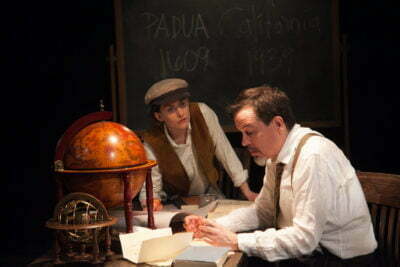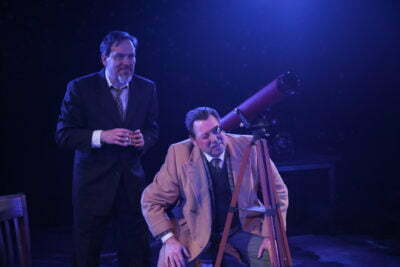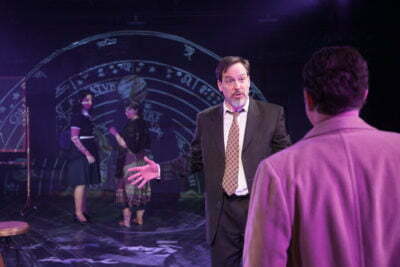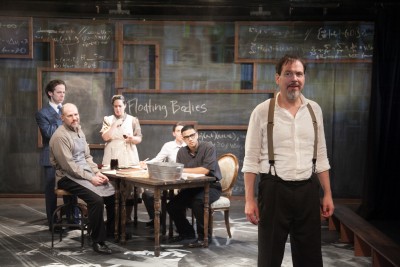The Life of Galileo
By Bertolt Brecht
Translated and Adapted by David Hare
Directed by Nick Sandys
Produced by Remy Bumppo, Chicago
Excellent Production Never Stops Moving
Like most translated works by prominent authors, Bertolt Brecht’s The Life of Galileo presents a director with many different versions to choose from. But this play is particularly open to interpretation because there is no definitive version of it even in the original German. Brecht (1898-1956) worked and re-worked it from the late 1930s until the end of his life, and even collaborated on an English adaptation with Charles Laughton while living in Hollywood. What started off as a simple, straightforward Marxist-inspired narrative about the inevitability of social progress brought about by new technology was complicated by the development of the atom bomb, and perhaps, the establishment of an actual communist regime in Germany. Since Brecht’s death, the play has been reworked several times by other authors, and director Nick Sandys selected David Hare’s version due to its quicker pace and vernacular dialogue. This is surely one of Brecht’s most important works, and yet, for those used to the anti-realist writing techniques Brecht experimented with, it may come as a surprise that this play is still, at its core, a straightforward historical drama.

We first see Galileo Galilei (Shawn Douglas) as an idealistic professor in Venice who has to take on private students because he cannot get by on what the university pays him. The chancellor (Blake Montgomery) has an answer for that: Galileo should develop technology the university can make money off of if he wants to get more funding, and in the meantime, he should be grateful for his intellectual independence (yes, the play is still in many ways relevant). Galileo’s newest student, Ludovico (Caleb Probst), tells him of the recently invented telescope, and Galileo makes his first substantial amount of money in a long time by pretending to have invented it. The chancellor is enraged when he uncovers the professor’s deception, but while Galileo did not invent the telescope, he did see the potential in it to be more than a toy or a military tool: he turns it toward the stars.

Galileo’s discovery that Jupiter has moons utterly discredits the geo-centric, Ptolemaic model of the universe which has held sway since ancient times. He is delighted to have proof supporting the much simpler heliocentric theory put forward by Nicolaus Copernicus, but Galileo’s friends warn him that by contradicting scientific orthodoxy, he is contradicting political orthodoxy. No longer under Venetian protection after his telescope fraud, Galileo finds a precarious position at the court of Florence, where he is subject to the Inquisition, and becomes the subject of great controversy. He has supporters within the Catholic Church, but also fearsome enemies, who claim he is undermining the special place humans have in creation, and therefore, not only the Church’s claim to power, but the basis of morality and the value of human life itself. Galileo finds these objections histrionic and ridiculous, but in a time of deep popular dislike for the Church, his teachings are seized upon by its enemies, putting him, his family, and his students in an awkward and dangerous position.

Douglass plays Galileo as he’s written: a man so complacently confident in other people’s powers of reason that he does not recognize his folly until it is too late. But from the opening incident with the telescope, he’s willing to put his own advantage above principle, and it’s a credit to Douglass’s acting that he so often makes us forget this. The final scenes, in which Galileo deals with the fall-out of his recantation, is Douglass’s moment to shine, as the full weight of what Brecht conceives as his historical legacy falls upon him. They are also the stand-out moments for Kelsey Brennan as Andrea Sarti, a boy who has admired Galileo for his entire life, and is the play’s conscience until the revelation of Galileo’s human weakness shakes him as deeply as the revelation of the universe’s true nature shook the people he thought needed awakening. Most of the other actors play multiple characters, and Montgomery deserves particular credit for playing both the chancellor and Cardinal Barberini, who became the Pope who reluctantly condemned Galileo. His roles require him to balance comic caricature with real menace, and even, as Barberini, moral conflict.

Finding the real conflict in the story is director Nick Sandys’s accomplishment as well. For most of the play, we are presented with a person who is objectively right battling with people who are willfully ignorant and wicked or think themselves to be engaged in a noble lie. Rachel Lambert’s early twentieth century costume design and John Boesche’s projections of dates and places referencing Brecht’s life are obscure to people who don’t already know their significance, but don’t detract from the presentation, and look quite lovely with Joe Klug’s set. However, while the play never loses our interest, it’s not until we get to the end that we see the point Brecht discovered in his own work. By capitulating, the father of modern science allowed technological progress to take place only on terms dictated by the entrenched powers. Brecht saw that with nuclear weapons, but heliocentrism turned out not to really be a threat to the Church or princes, either. By the end of Galileo’s century, autocrat Louis XIV was calling himself the Sun-King (because the world revolved around him), and Jesuits were using the newfound ease of predicting the movement of planets as evidence that the universe was designed by an intelligence who made humans in His own image. The complex relationship between science and power was one Brecht spent the latter part of his life reconsidering, and in The Life of Galileo, we are forced to reconsider it as well. Perhaps, in that sense, it fits into his conception of Epic Theatre after all.
Highly Recommended
Jacob Davis
[email protected]
Reviewed March 28, 2016
For more information, see The Life of Galileo’s page on Theatre in Chicago.
Playing at The Greenhouse Theater Center, 2257 N Lincoln Ave, Chicago. Tickets are $42.50-52.50 with discounts for students and groups; to order, call 773-404-7336 or visit RemyBumppo.org. Performances are Thursdays-Saturdays at 7:30 pm (with select Wednesday performances at 7:30 and weekday matinees at 2:30), and Sundays at 2:30 pm through May 1. Running time is two hours and forty-five minutes with one intermission.

